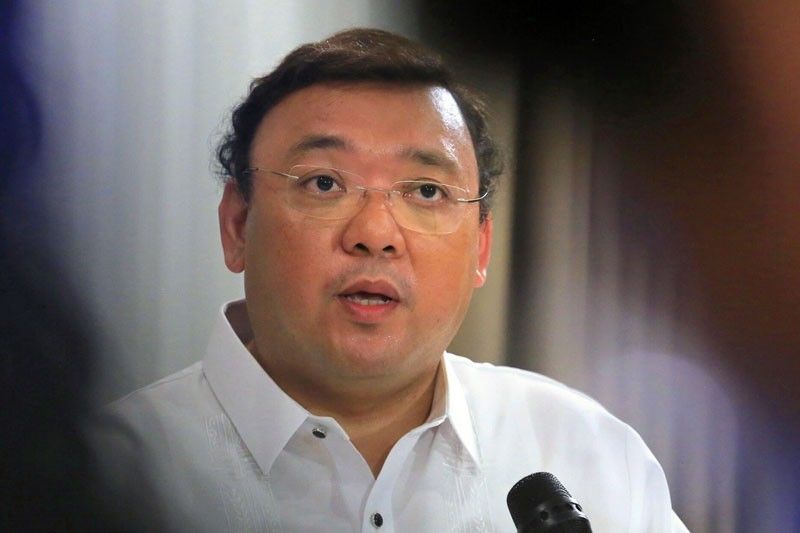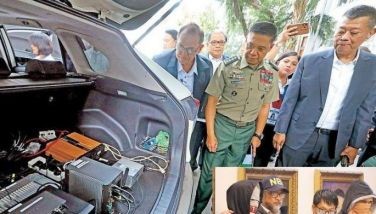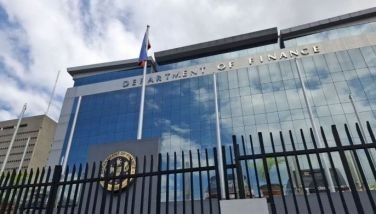Philippines to exhaust diplomatic options on SCS

MANILA, Philippines — The government is still in the process of exhausting all diplomatic means to address concerns over China’s deployment of missiles on the manmade islands at the South China Sea (SCS), Presidential spokesman Harry Roque Jr. said yesterday.
“If it is verified, of course, we view it with much concern because any form of militarization of the West Philippine Sea is worrisome, given that it is one of the busiest sea lanes of the world,” Roque said at a press briefing in Davao City.
Roque added that there is no need at this time for the government to summon Chinese Ambassador Zhao Jianhua to shed light on the issue.
He said the Philippines will “resort to diplomacy, resort to diplomatic protest if the (Department of Foreign Affairs) deems it fit.”
“But (the Philippines) resorts to all forms of peaceful resolution of disputes and of course, we capitalize on the fact that we have a very good relationship with China,” Roque said.
President Duterte is unlikely to bow to pressure to assert the Philippines’ sovereign rights over the disputed areas in the Spratlys after the Chief Executive questioned the apparent inaction of the previous Aquino administration when Beijing was constructing structures in the area.
“The President has spoken. He said he was hoping that the previous administration was able to act on this since the artificial islands were dug, built during the past administration,” Roque added.
“We are not blame-tossing but we have to realize that (the structures) are already there,” he said.
Roque added that the Palace has yet to get official confirmation of the reports by US media.
“Everything we read in the papers is based on a US media report, which we really should not completely rely on. So we are first verifying if it is true,” he said.
For their part, senators agreed that the militarization of the South China Sea is cause for alarm.
Sen. Gregorio Honasan said yesterday there is reason for the Philippines and the rest of the region to be alarmed by China’s militarization of the sea.
Honasan, chairman of the Senate committee on national defense and security, said the Philippines should start talking with its regional and defense allies to look for ways to address the actions of China, which affect not only the sovereignty of the Philippines, but also the economic and security interests of many nations.
In an interview over dwIZ, Honasan said the Philippines has every reason to be alarmed by the installations of China in the West Philippine Sea because they are within its territory, something that has been affirmed by the Arbitral Tribunal in The Hague.
While the Philippines has the right to assert its jurisdiction over the West Philippine Sea, Honasan admitted that getting China to acknowledge this is another matter.
In order to get China to listen, Honasan said the Philippines should now tap its allies to exert some pressure on them.
“So we should now make an inventory of our allies. It appears that China, while having the economic and military might, is alone in its actions,” Honasan said.
He said the government should invoke its Mutual Defense Treaty and Enhanced Defense Cooperation Agreement with the US and its alliance with its regional neighbors under the Association of Southeast Asian Nations to help defend Philippine sovereignty.
Honasan said President Duterte himself could also use his close relationship with the Chinese to help resolve the situation since he has a direct line to Beijing.
According to Honasan, it is in the best interests of the global community to back the Philippines on this matter because what China has done in the South China Sea is, in effect, controlling the maritime and air space in the disputed waters.
What is most important in all these efforts, Honasan said, is to come up with a peaceful solution because the Philippines cannot afford an armed conflict with China.
Sen. Leila de Lima, in a statement, said China has crossed yet another line with its installation of surface-to-air and surface-to-surface missiles in the Spratlys.
She said the Armed Forces of the Philippines (AFP) cannot remain silent while all of this is going on, considering that this could now be considered the “single biggest threat to national security in recent decades.”
“The Chinese cruise missiles in the Spratlys are now the single biggest existential threat to the Philippines and to Filipinos. But apparently, in line with the President’s amorous affair with China, the AFP has chosen to play the monkey that sees, hears and speaks no evil whenever it comes to China’s aggressive escalation of military capabilities in the (West Philippine Sea),” De Lima said.
“It is time that the AFP draw the line between Duterte’s mendicant policy toward China, on the one hand, and national defense and security, on the other,” she added.
De Lima said this is a wake up call for the AFP as well as the civilian hierarchy.
Sen. Joseph Victor Ejercito said the installation of missile systems in the West Philippine Sea by China is an assault on the sovereignty of the Philippines.
Sen. Sherwin Gatchalian said the reports of China deploying missile systems in the West Philippine Sea, if verified, “must be seriously be looked into and dealt with high concern and priority by the government.”
“More than ever, the Philippines must remain calculated with its actions in responding to this troubling move by China, acknowledging that it is still within our interest to maintain good Philippine-Sino relations,” Gatchalian said.
“Needless to say, we must defuse the tension by making the most of the best available bilateral and multilateral diplomatic options. We should also strengthen our security and defense cooperation with regional and global security partners, while enhancing and modernizing the defense capabilities of our own military,” he added. - With Marvin Sy
- Latest
- Trending
































